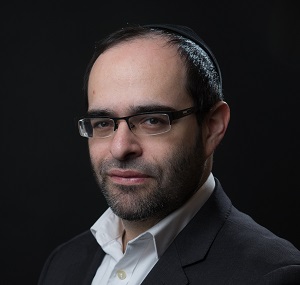Finding a Pathway to Hope

Life without meaning or feeling fulfilled, without any hope of change, is a difficult one to live

HE
has a quiet intensity. He’s thought this through, and he’s concluded that what he’s saying is painfully true. It’s a truth he struggles with — and resents.
“I’m angry.”
“That’s kind of obvious,” I answer. “What can you tell me about that?”
He thinks for a bit. “It’s not so clear cut,” he starts. “There’s a lot of resentment. Toward my wife, my parents…” he trails off. “My kids, even. That’s kind of embarrassing, honestly. They’re just kids, it’s totally not their fault.”
“You’re in a really tight spot, and they do contribute to that. Makes sense.” I nod slowly. “Sounds like there’s more?”
He takes a breath. “I’m angry at Hashem,” he says quietly. “I just really am. Like, I know I’m supposed to be grateful, and I know that there’s a plan, and I know, well, all the stuff I should know. But, well….” He waves his arms around a bit. “How am I supposed to do this?”
“Do….”
He waves again, a little more animated this time. “All of this!” He’s gaining steam here. “I work, my wife works, we have a big family, we have financial responsibilities, family responsibilities, I go to minyan and learn every day… I just get pulled in all these different directions, all the time! It never ends!”
The anger is really coming out.
“Why am I in this insane system of always running and never having a minute to breathe, barely making ends meet, barely holding my marriage together? Where does it end? What’s the point? Does it really matter? Do I matter?”
He pauses to breathe. The impact of what’s just exploded out of him seems to hit him like a sack of wet cement. He’s deflated.
“What’s the point? Sometimes it just feels like some cruel trap, some terrible game that we’re just pieces of for no good reason, and we have to go through the motions until we die.” Another sigh. “And now I’m an apikorus for saying all that. I don’t want to be, and now I’m angry at myself, too.”
This unnamed individual isn’t one specific person, but he very well could be. While there are many men who navigate frum life and its demands relatively well, there are also those who have significant trouble with it. Think of frum society as a bell curve. Some of us fall into the upper range of being generally satisfied and fulfilled. We do what we need to and find meaning and purpose in it. Some are in the middle of the curve — they aren’t as happy, but they’re still okay with what they’re doing.
Then there are those who are “frum functioning,” who feel overwhelmed by all the juggling and just don’t have the headspace to connect with frumkeit as more than a source of pressure and frustration. People in this last group tend to feel pretty stuck. Leaving isn’t an option they’re willing to consider; they truly believe shemiras hamitzvos is the correct way to live. They’re not feeling it, though. It’s a life of pressure and frustration. They’re left in a painful and hopeless status quo.
It’s a lonely and shameful place, too; after all, everyone else seems to be doing fine. “I want to connect with this, and I can’t seem to do it anymore. Why am I having trouble with this? No one else is, I shouldn’t be” — this is a common thought process for people on that end of the curve. This leads to more self-blame and isolation, which makes everything worse. They come to see their observance and connection to the ideal way of life as hanging by an ever-thinning, ever-tenuous thread, with no way out.
If someone is routinely asking himself, “What’s the point?” odds are the person is generally pretty miserable. Life without meaning or feeling fulfilled, without any hope of change, is a difficult one to live. It’s often not sustainable, either. It usually gets worse if left on its own.
Frum life has a lot of moving parts, regardless of which side of the mechitzah you sit on. Men have a particular set of responsibilities and expectations that can be difficult to meet. How can a frum man manage these expectations and balance his life in a way that makes sense, is fulfilling, and, dare I say, actually feels good for a nice chunk of the time?
The Mechanics of Despair
It’s hard to engineer solutions to problems we don’t understand. Let’s understand the question of “What’s the point?” and what it implies about the thought process of the person asking it.
There are three ways to relate to unwanted or uncomfortable circumstances. The first is to look at it from a “power” standpoint. Is this circumstance one that I can change in some way, or are there steps I can take toward being able to do that? Usually, when we think that through, we find some sort of concrete action we can take that may get us closer to our end goal. We have power, and we can use it. There’s something about this situation that tells us, “I’m in control, at least partially.”
We usually feel the best about this kind of dynamic. People in general, and men in particular, feel most comfortable when we’re either in complete control of things or intentionally working toward an existence of our own design.
The second way is when there’s no practical action we can take, but we see a route possibly leading to where we’d like to be. When we see that we really can’t influence our circumstances due to forces or decisions beyond our control, but we can see how it could potentially work out for the best, that’s called hope. It’s not as comfortable as knowing “I can do something about this issue” — but it’s okay. It makes sense to the hopeful person that he may get what he wants, or at least enough of it to make things manageable. He can sit with that.
When there is no power, and there is no hope, there’s despair. Despair means that your current situation didn’t come about as a result of any action you’ve taken, can’t be significantly impacted by anything you do, and won’t improve under its own internal logic. There’s no sense of control and no real room for hope. There’s certainly no reason to assume that the situation will get better. If your constant internal refrain is, “What’s the point?” this is likely where you are.
To make matters worse, living with this mantra running through your head reinforces not just the hopelessness of the situation but also the idea that, “I am a powerless person.” It becomes about you, not just what’s going on around you. Regardless of where you are, you can’t leave yourself behind. If you experience your very being as ineffective, powerless, and without hope, that’s going to be the lens through which you view everything in your life.
Life becomes an exemplification of how powerless you are. There’s nothing you can do to change it.
Reclaiming Power and Hope
The question here now becomes: What can you do when you feel mired in this depth of hopelessness or powerlessness, and you want to change the situation so you can stop feeling that way? Whatever happens next, the ultimate goal is to instill some sense of agency in your life. You want to come out feeling that there‘s something practical you can do to make a difference, and that you’re actually capable of taking that theoretical step.
The changes most available to you are the ones you probably won’t feel comfortable with. Don’t want to go to work? Or shul? You have every right to make that choice, and no one can stop you. On the other hand, that’s an obvious choice, and there might be many reasons you haven’t chosen that direction. Maybe it’s because of your strong belief that these are the things you need to do, even though you haven’t felt it for a while. Maybe it’s partially because of the likely social or spiritual ramifications involved.
By choosing to keep following the same path, and not stepping off, you’ve determined that this path is an important one, even though you’re miserable walking it. The resistance you feel going through this day after day isn’t coming from what you’re actually doing; there’s real significance and importance there. The problem is that something’s off about the way you experience it.
The feelings here aren’t about being stuck in a hopeless situation. They’re about choosing to be in a particular situation but nevertheless experiencing it in an uncomfortable and hopeless way.
What makes your experience of this so unbearable, and what needs to change to make it better? To take it a step further, what needs to change to make it meaningful, or even enjoyable? Is that change something you can effect, even in some small way? Even if the change isn’t one you can see making now, might it happen down the road? What can you do to take a small step toward it?
See what we did there? Now there’s something to work with.
This shift isn’t one people easily consider when they’re feeling stuck on such a global scale, especially when the choices they’ve resigned themselves to are for things they assume to be needed and important.
When people are faced with something new, some sort of big decision, they often invest a lot of time and effort, and possibly even money, into answering that question and acting on the results. Once something has worked itself into a routine, though, it’s hard to come back to it for a second look. It’s even harder to do that when part of the message you’re telling yourself is, “Even if others might be able to make some kind of a change, I can’t.” The whole exercise comes across as kind of pointless.
How did this situation develop? How did it become so overwhelmingly hopeless, and how did it stay that way? There’s value in understanding that, sure, but the way past it is to find an action step you can latch on to. Find something you can look at and say, “I’m not completely helpless. I have some sense of agency in my life.”
Start small. Identify one area of your life you feel might give you a sense of hope if you could experience it differently. Determine what step you’d need to take to make that difference real, and then focus on that one small step. There may be other steps that follow, but doing this helps you to feel like you’re not helpless, and that the situation isn’t locked in.
Somehow, the power is back on. Maybe there’s some hope again.
Yeshaya Kraus, LCSW, is a therapist in private practice in Far Rockaway, specializing in men’s mental health, parenting, relationships, and dating. He is also the creator of the Building Together workshop for engaged and newly married couples. Yeshaya speaks publicly on a variety of topics, including dating and marriage.
(Originally featured in Mishpacha, Issue 1046)
Oops! We could not locate your form.







